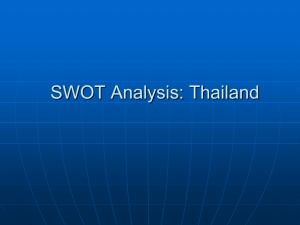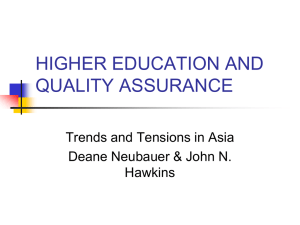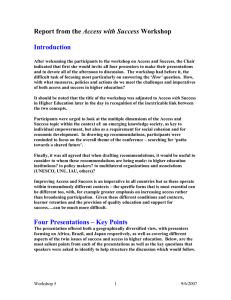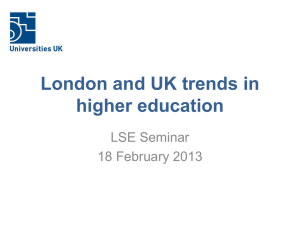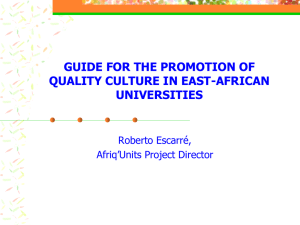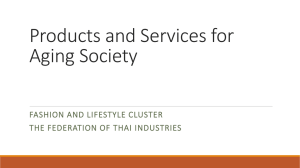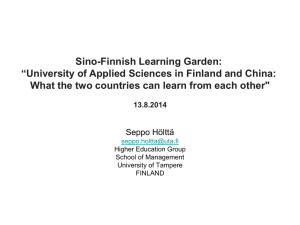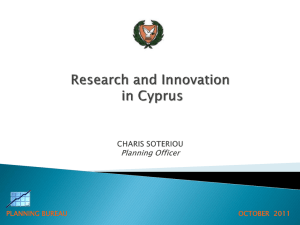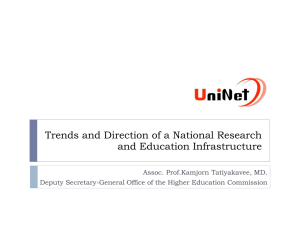higher education in thailand - Office of Science and Technology
advertisement
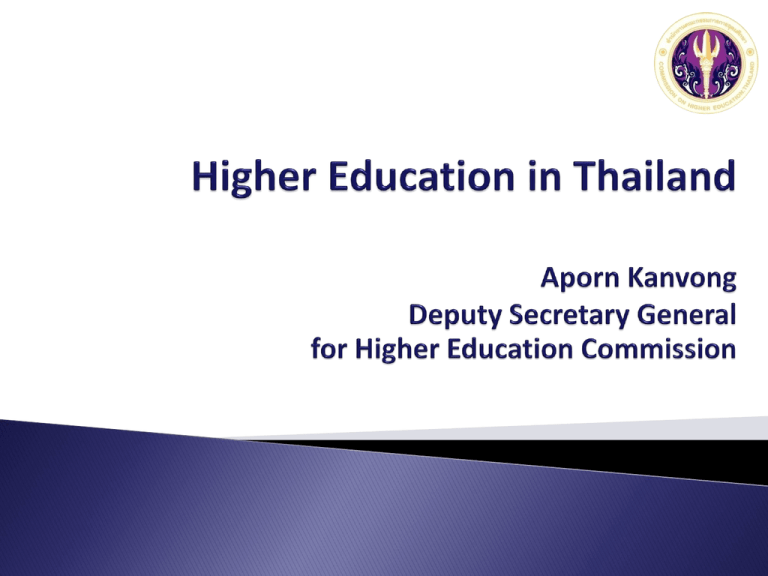
Higher Education Overview Higher Education Policy Quality Policy & Research Promotion Ministry of Education Office of the Permanent Secretary Office of the National Education Council Office of the Basic Education Commission Schools Office of the Vocational Education Commission Vocational Colleges Office of the Higher Education Commission Private/Public HEIS & Community Colleges Ministry of Education Autonomous Universities Office of the Higher Education Commission Higher Education Commission Secretary General Public Higher Education Institutions Private Higher Education Institutions Public Organizations Internal Auditor Public Sector Development Group Bureau of General Administration Bureau of International Cooperation Strategy Bureau of Community College Administration Bureau of Student Development Bureau of Policy and Planning Bureau of Standards and Evaluation Bureau of Cooperation and Promotion Bureau of Personnel Admin. & Development Office of the Higher Education Commission has the authority to manage and to promote higher education on the basis of academic freedom and excellence . Mandates: 1. Formulate policy recommendations, higher education standards, higher education development plans and handle international cooperation in higher education; 2. Devise criteria and guidelines for resources allocation; 3. Coordinate and promote human resources development and student capabilities, including handicapped, disadvantaged, and talented students in higher education institutions; 4. Coordinate and promote research activities to support the national development; 5. Provide recommendation on the establishment, dissolution, amalgamation, upgrading and closing down of higher education institutions and community colleges; 6. Monitor, inspect, and evaluate outcomes of higher education management as assigned by the Higher Education Commission, and compile data and information on higher education; 7. Serve as the secretariat to the Higher Education Commission; 8. Perform other functions as prescribed by the Minister of Education. Office of the Higher Education Commission Public Universities (80) Private HEIs (71) Community Colleges (21) Autonomous Universities (15) Universities (65) Universities (41) Institutions (9) Colleges (22) • Inter University Network (UniNet) • IT network for education & research • ThaiLIS • Link with Internet2, TIEN3 • Expand to National Education Network (NEDNET) Thailand Cyber University • Develop online courses & deliver through UniNet • Provide virtual library Chulabhorn Research Institute • Conduct research in - Chemistry - Biomedical - Environmental Toxicology - Biotechnological • Operate a hospital 10 Centres of Excellence • Innovation in Chemistry • Environmental Health, Toxicology and Management of Chemicals • Environment and Hazardous Waste Management • Petroleum, Petrochemicals & Advanced Materials • Energy Technology and Environment • Agricultural Biotechnology • Mathematics • Physics • Biodiversity • Postharvest Technology Innovation Policy Statement of the Council of Ministers delivered to the National Assembly National Plans • • National Economic and Social Development Plan National Education Plan National Administrative Plan H E Development Plan • 15-Year Long Range Plan • Ministerial Operational Plan (4- year plan) 5-Year Plan Ministerial Yearly Operational Plan Request for fiscal budget expenditure for each agency Contract of Ministry/ Department Fiscal Budget Quality of Research Quality of Teaching Contributions to Social and Economic Development Internationalisation Employability of Graduates Quality of Higher Education Source: Dr. Sumate Yamnoon, former Secretary-General for Higher Education Commission - Dialogue on “Quality of Higher Education in Thailand” • Investing in raising quality of entire education system • Providing no fewer than 12 years of free basic education • Upgrading teacher training and development • Using ICT to enhance learning efficiency • Developing quality and standards of HEIs The 11th National Economic and Social Development Plan • Articulating higher education system with basic and vocational education • Solving existing problems in higher education • Enhancing HE and country’s competitiveness • Investing in staff development • Financing , governance, and management • Networking universities The 2nd 15-Year Long Range Plan for Higher Education • Improve the quality of education by undertaking reform of Thailand’s knowledge system • Create and ensure equal educational opportunities for all groups of the population • Teacher reform - Upgrade the teaching profession to be a truly high-skilled occupation • Design university and vocational education to meet with the need of the labor market • Ensure that the use of information technology for education meets international standards • Promote research and development to enhance national intellectual capital • Prepare for liberalization due to the formation of ASEAN Community • Accelerate quality development of education and learners • Increase access to education • Reinstate peace in the Three Southern Border Provinces • Alleviate drug-related problems • Develop tablet content for the One Tablet per Child Project • Focus on research and development • Promote the New Business Fund Project • Push forward the People’s constitution • Accelerate the disbursement of government budget • Develop administration and management systems • Work closely with other ministries and agencies to move forward government policies Government Policy Ministry of Education’s Policy THAILAND IN THE YEAR 2016 11th National Economic and Social Development Plan Second Decade of National Education Reform (2009-2018) National Science Technology and Innovation Master Plan (2012-2021) 11th Higher Education Development Plan (2012-2016) E (Education) G (Graduate) Freedom of Learners’ Choice E L O N G Generate Quality Trust F Satang Utilization National Sustainable Development I Graduates with Quality and Social Responsibility S (Satang) Outcome of Creative Research L Information Based Educator Professional Leader of Change Management for Quality Education Leader of Change Management for Quality Education (All for Quality Education and Quality Education for all) Government Policy in Education and Technology Development Learner Quality Improvement L (Leader) 8th National Research Strategy (2009-2016) Educator Professional National Education Plan: Revised (2009-2016) Public and Private HEIs Thai Education Policy’s Equation 11th National Economic and Social Development Plan 2nd 15-Yr. Long Range Plan for Higher Education Government Policy Ministry of Education’ s Policy 11th Higher Education Developm ent Plan • Reform of Education System • Articulation of all levels of education • Governance and financing • Teacher and education personnel development • Enhancement of education quality • Accessibility to education and life - long learning • Employability of graduates, role of real sector & enhancement of national competitiveness Addressing Special Issues 5 -year H E Development Plan • • • • • • Preparation for ASEAN Community Education Hub Entrepreneurship Fund Professional Teachers Project Income Contingent Loan Academics Services with Social Impact 2nd Long Range Plan for H E (2008 – 2022) 4 groups of HEIs • Research University/ Postgraduate University • Science and Technology University/ Specialized University/ Comprehensive University • Four-Year University/ Liberal Arts University • Community College Quality • 11 Centres of Excellence and 9 National Research Universities • Grouping of Higher Education Institutions University Staff Development • Strategic Fellowship for Frontier Research Networks • Student and Staff Mobility Articulation of all levels of education • Professional Teachers Project Accessibility to Education • Student Loan Fund • Income Contingent Loan • Thailand Cyber University Information Technology • 15-Year Free Education Project • Infrastructure: Expansion of UniNet to NEDNET • Content: Thailand Cyber University University - Industry Linkage • University Business Incubator (UBI) • Technology Licensing Office (TLO) • Commercialization of research: technology transfer and body of knowledge development Role of Higher Education in the Regional Grouping • Support the role of the ASEAN University Network (AUN) • Support the role of the SEAMEO Regional Centre for Higher Education and Development (SEAMEO RIHED) • Support the University Mobility in Asia and the Pacific (UMAP) • Development towards the Integration of ASEAN Community in 2015 • Learning experience from the Bologna Process of the EU Develop QA system and mechanisms Encourage HEIs to develop internal QA Provide mechanisms for quality audit & assessment National Qualifications Framework Credit transfer & qualifications recognition nationally & internationally Knowledge Ethics and moral 5 domains of learning outcomes Cognitive skills Numerical analysis & communication & IT skills Interpersonal skills & responsibility 1. 2. 3. 4. Computer Nursing Logistics Hotel and Tourism management 5. Engineering 6. Accounting 7. Education (5 yrs.) 8. Applied Thai Traditional Medicine 9. Sciences and Mathematics 10. Thai Language 23 fields of study 1. 2. 3. 4. 5. 6. 7. 8. 9. 10. 11. 12. 13. Agro Industry Nursing (Master) Veterinary Science Thai Language Physical Therapy (Graduate) Liberal Arts Educational Administration (Graduate) Business Administration Dentistry Home Economics Architecture Environment History 14. Public Administration 15. Economics 16. Agriculture, Forestry, Fisheries 17. Communication Arts and Mass Communication 18. Medical Science 19. Pharmaceutical Science 20. Public Health 21. English Language 22. Industrial Technology 23. Industrial Education Strategic Fellowship for Frontier Research Networks Technology Licensing Offices National Research Universities University Business Incubators Centres of Excellence Research and Innovation for Technology Transfer to the Rural Communities Project Chiang Mai University King Mongkut’s University of Technology Thonburi Chulalongkorn University Mahidol University Kasetsart University Prince of Songkla University Khon Kaen University Suranaree University of Technology Thammasat University Level of Study 2010 2011 2012 Certificate 62,343 64,183 66,513 Bachelor’s degree 1,808,062 1,867,081 1,917,013 Master’s degree 193,259 204,706 213,891 Doctorate 20,143 22,347 24,370 2,083,807 2,158,317 2,221,787 Total 120 100 80 60 40 20 0 100 70 14 9
